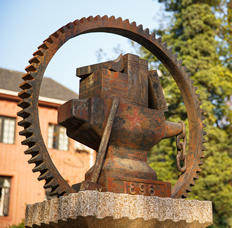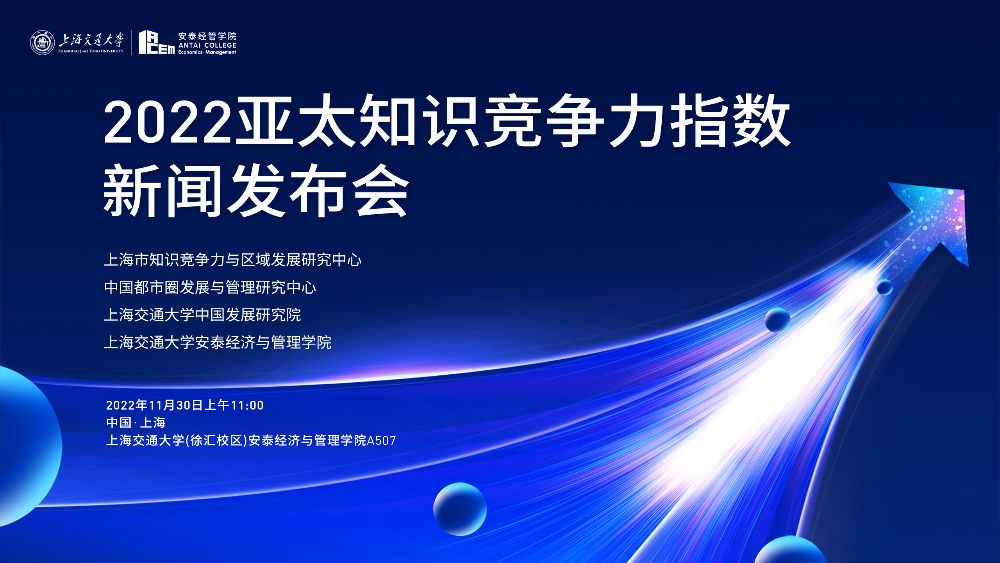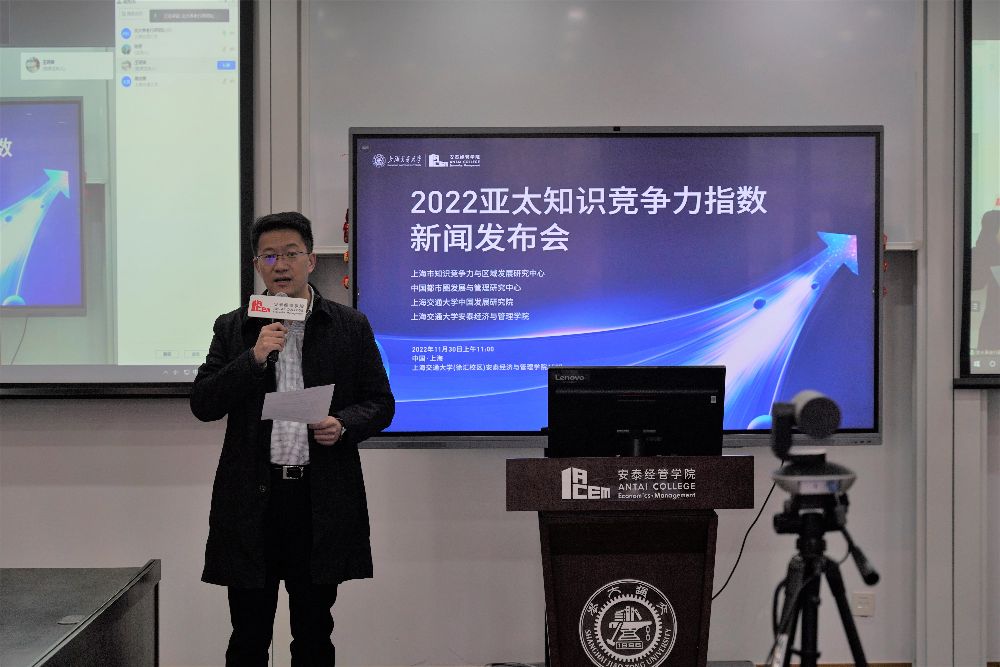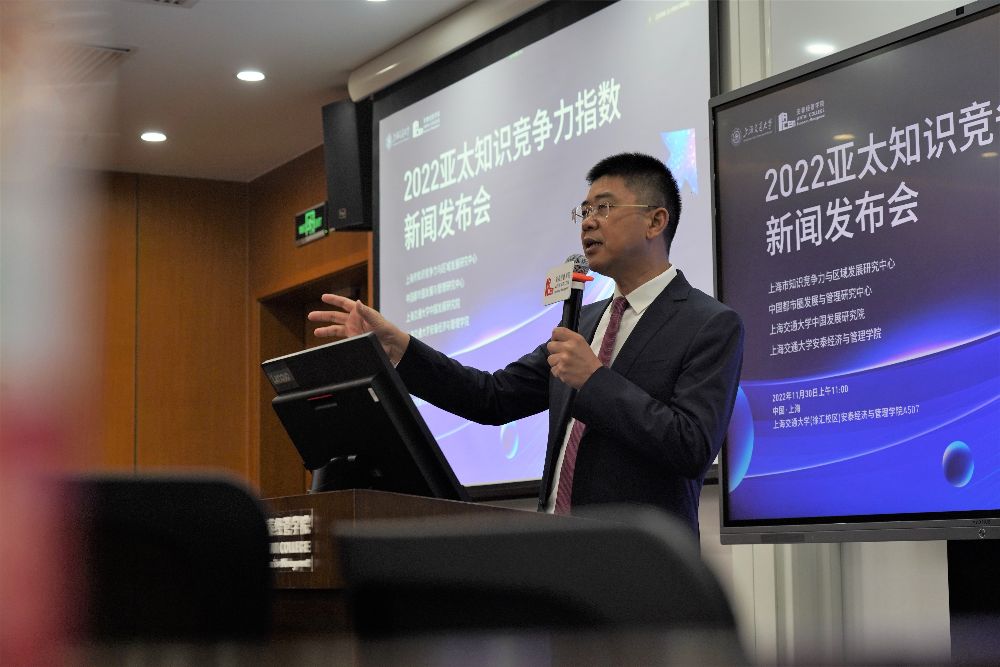Asia-Pacific Knowledge Competitiveness Index released in 2022: Singapore ranks first and Shanghai second
Publisher : MBA Office Dec.03,2022
On November 30th, 2022, the 2022 Asia-Pacific Knowledge Competitiveness Index, jointly developed by Shanghai Soft Science Base -- "Shanghai Knowledge Competitiveness and Regional Development Research Center" and Asia-Pacific Sub-center of Centre for International Competitiveness, was released at Shanghai Jiao Tong University (SJTU), which is the thirteenth release of the ranking since 2010. The release was presided over by Xie Zhitao, Vice Director of Liberal Arts Development Department of SJTU and Executive Vice Director of Think Tank Center, and attended by Tang Tianbo, Deputy Director of Shanghai Science and Technology Development Research Center.
The index has evaluated 53 Asia-Pacific regions based on 19 indicators, reflecting the ability of each region to transform intellectual capital into economic value and wealth for its residents. Singapore has retained the championship and Shanghai has jumped from the fourth place to the second. The third to tenth places are Tokyo, Seoul, Ulsan, Taiwan, Hong Kong, Beijing, Western Australia and Israel. Taiwan rises fastest which has jumped to the sixth place from 16th of last year.
China has done well on this year's list, taking four places of the top 10. There are significant differences in knowledge competitiveness in Chinese mainland, which are distributed in three echelons. Shanghai and Beijing in the first echelon rank among the top 10, while Guangdong, Tianjin, Jiangsu and Zhejiang in the second echelon rank 17th to 20th. The rest are in the third echelon, including Shandong, Fujian, Jiangxi, Hunan and Chongqing ranking among the top 30. Of all the mainland provinces and regions, Hunan, Tianjin and Ningxia have made the quickest progress, rising by eight, seven and six places respectively.
Luo Shougui, Chief Expert of the Knowledge Competitiveness and Regional Development Research Center of Shanghai Soft Science Research Base and Professor of Antai College of Economics and Management (ACEM) of Shanghai Jiao Tong University (SJTU), who has developed this ranking, pointed out that the evaluation mainly referred to the data in 2021. Over the past year, the pandemic has imposed a huge impact on global industrial chain and supply chain, but China is the only country with a positive growth among the world's major economies. Among the 19 indicators, many Chinese cities and provinces rank among the top 10 in individual indicators, of which seven cities or provinces are listed in the number of employees in knowledge-intensive manufacturing industries per 1,000 employees, six in economic activity rate, the number of managers per 1,000 employees and the number of patent licenses per million residents respectively, and five in employment rate.
Shanghai's knowledge competitiveness has ranked the top 10 for 10 consecutive years and the top five for seven consecutive years since 2016. This year, Shanghai has jumped to the second place, depicting a steady upward trend. Shanghai's advantages in knowledge-intensive industries are particularly obvious, with four knowledge-intensive manufacturing industries ranking second overall and knowledge-intensive service industry also ranking second. Its employment density of knowledge-intensive industries has a prominent strength among all 53 regions. Those have demonstrated great achievements of Shanghai's industrial structural transformation and upgrading. In addition, Shanghai has ranked second in private equity investment, fifth in the number of managers per thousand employees and the government's R&D investment, and sixth in regional economic output intensity. Shanghai has shown strong competitiveness in human capital, knowledge production and knowledge economy output.
During his stay in Shanghai, President Xi Jinping personally presided over the revision of Shanghai's overall development goals in the report of the Ninth Congress of the Communist Party of China of Shanghai, with special emphasis on "transforming the mode of economic growth" and proposing the goal of "knowledge competitiveness ranking among the top in the country" ("Xi Jinping in Shanghai", page 9, lines 3-4, Press of Party School of the Central Committee, 2022). Today, Shanghai is not only among the top in terms of knowledge competitiveness in China, but also in the Asia-Pacific region. Shanghai has successfully completed the task and continues to make steady progress towards higher goals.
Beijing has ranked first in terms of employment density of knowledge-intensive service industry, government's R&D investment and per capita private equity investment, and the number of patents per million residents, with obvious advantages in innovation investment and knowledge output.
Luo Shougui pointed out that China's per capita GDP hit the record high in 2021 by exceeding the world average, and next, China will move from a middle-income country to a middle-developed country. The main objectives and tasks proposed by the "20th National CPC Congress" in the next five years are: Make breakthroughs in promoting high-quality economic development; achieve greater self-reliance and strength in science and technology; make major progress in creating a new pattern of development and building a modernized economy. Future economic growth must be driven by innovation and supported by knowledge economy.
2022 Asia-Pacific Knowledge Competitiveness Index Ranking
Region | Index | 2022 Ranking | 2021 Ranking |
Singapore | 151.87 | 1 | 1 |
Shanghai | 140.51 | 2 | 4 |
Tokyo | 137.65 | 3 | 2 |
Seoul | 136.09 | 4 | 3 |
Ulsan | 134.98 | 5 | 6 |
Taiwan | 134.41 | 6 | 16 |
Hong Kong | 133.04 | 7 | 5 |
Beijing | 132.39 | 8 | 7 |
Western Australia | 131.17 | 9 | 8 |
Israel | 129.61 | 10 | 10 |
New South Wales | 128.34 | 11 | 11 |
Aichi Prefecture | 128.28 | 12 | 9 |
Victoria | 127.61 | 13 | 12 |
New Zealand | 124.15 | 14 | 13 |
Osaka | 124.10 | 15 | 14 |
Kanagawa Prefecture | 123.58 | 16 | 15 |
Guangdong | 123.20 | 17 | 21 |
Tianjin | 122.94 | 18 | 25 |
Jiangsu | 122.64 | 19 | 22 |
Zhejiang | 122.36 | 20 | 20 |
Toyama Prefecture | 122.29 | 21 | 17 |
Shizuoka Prefecture | 122.12 | 22 | 18 |
Shiga Prefecture | 121.72 | 23 | 19 |
Tochigi-ken | 120.09 | 24 | 23 |
Kyoto | 118.79 | 25 | 24 |
Shandong | 116.02 | 26 | 27 |
Fujian | 115.86 | 27 | 28 |
Jiangxi | 115.03 | 28 | 26 |
Hunan | 114.56 | 29 | 37 |
Chongqing | 113.64 | 30 | 29 |
Hubei | 113.57 | 31 | 34 |
Tibet | 112.35 | 32 | 33 |
Henan | 112.04 | 33 | 31 |
Ningxia | 111.78 | 34 | 40 |
Shaanxi | 111.38 | 35 | 39 |
Sichuan | 111.04 | 36 | 35 |
Anhui | 110.92 | 37 | 30 |
Qinghai | 110.75 | 38 | 36 |
Hainan | 110.36 | 39 | 43 |
Shanxi | 109.81 | 40 | 45 |
Inner Mongolia | 109.75 | 41 | 44 |
Liaoning | 109.32 | 42 | 38 |
Hebei | 109.26 | 43 | 32 |
Xinjiang | 109.14 | 44 | 46 |
Guizhou | 108.67 | 45 | 42 |
Guangxi | 108.50 | 46 | 1 |
Jilin | 108.44 | 47 | 41 |
Gansu | 108.41 | 48 | 48 |
Yunnan | 108.14 | 49 | 51 |
Heilongjiang | 107.87 | 50 | 52 |
Karnataka | 107.73 | 51 | 47 |
Maharashtra | 107.41 | 52 | 50 |
Trengana | 107.16 | 53 | 53 |
Link: Knowledge competitiveness is the ability to create new concepts, ideas, processes, and products and to translate them into economic value and wealth. It includes not only the ability to come up with new ideas, but also the ability to develop their economic value.
The World Knowledge Competitiveness Index is proposed by the Centre for International Competitiveness headquartered in the United Kingdom. Since 2002, the Centre has published the World Knowledge Competitiveness Index (WKCI) annual report, which measures and ranks 125 major regions in terms of their knowledge competitiveness index. The Asia-Pacific Knowledge Competitiveness Index is a component of the index, which has been published in China since 2010 under the authorization of the Centre for International Competitiveness.
https://www.acem.sjtu.edu.cn/news/74493.html





